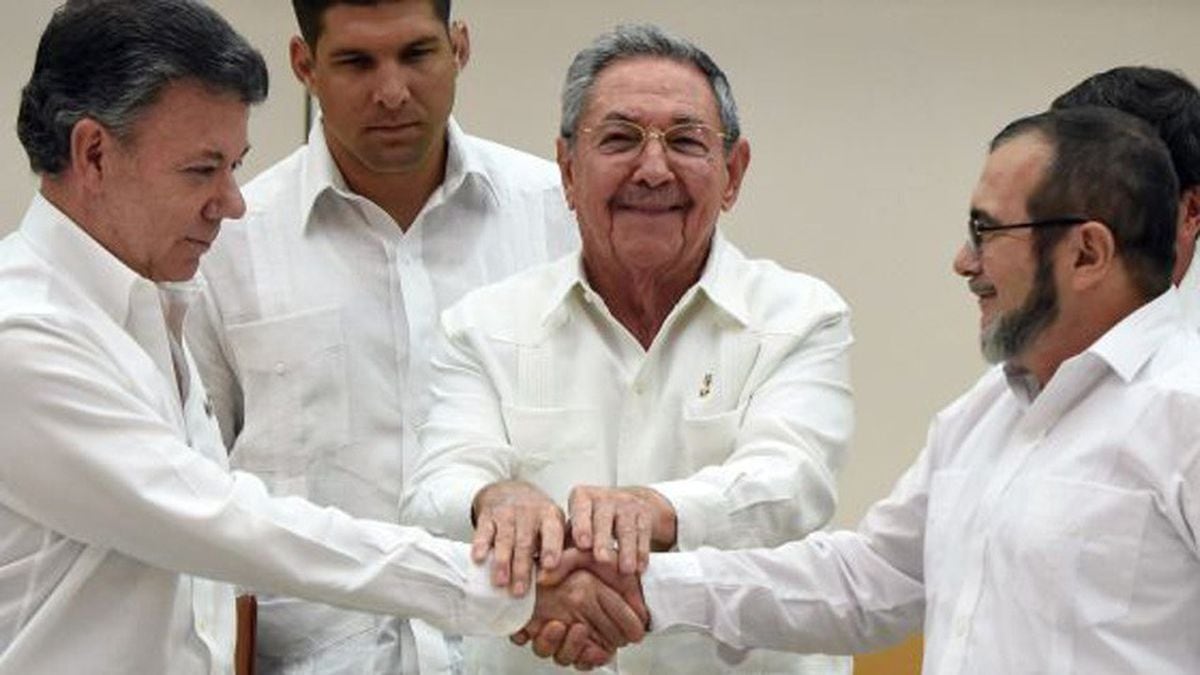Colombia and FARC agree to sign peace treaty within six months
Santos government and rebels reach historic deal on transitional justice in Havana talks

The government of Colombian President Juan Manuel Santos and the Revolutionary Armed Forces of Colombia (FARC) announced a major breakthrough Wednesday night aimed at putting an end to the 51-year-old insurgent war that has claimed the lives of more than 220,000 people.
After three years of negotiations in Havana, Santos and FARC leader Rodrigo Londoño, alias Timochenko, said they had reached a deal on the key issue of transitional justice and pledged to sign a definite peace treaty within six months.
We are adversaries, but today we advance in the same direction” Colombian President Juan Manuel Santos
The two shook hands as Cuban President Raúl Castro, who was one of the brokers of the talks, looked on.
“I want to assess the important step that the FARC took today,” said Santos. “We are adversaries, but today we advance in the same direction, the most noble direction of any society, which is toward peace.”
The two sides agreed to establish a March 23 deadline for signing the peace treaty. From that date, the FARC will have 60 days to disarm.
Transitional justice had been one of the stickiest issues during the Havana peace talks, which have broken down on several occasions since they began in November 2012.
The talks took a new turn in July when FARC leaders announced a new unilateral ceasefire and the government agreed to stop bombing rebel camps in Colombia. Since then, only a few skirmishes have occurred.
Under the deal, the government and the rebels have agreed to create a post-conflict international justice tribunal, which will sentence those who accept responsibility, including members of the insurgency, military officers, politicians, civilians and others who played roles in the war. Depending on the convictions, those sentences could be of between five and eight years in a low security facility.
Those who do not immediately accept their responsibility for causing harm to victims will be investigated by the tribunal, which will be made up of a panel of judges selected from Colombia and other countries. If found guilty, they could be sentenced to up to 20 years in a regular prison.
A reconciliation commission will also be created and reparations to the victims will be made under the terms of the agreement.
The Colombian government is also willing to give amnesty to up to 15,000 guerrillas, who are charged with political crimes or having ties with politicians, said Attorney General Eduardo Montealegre.
Transitional justice had been one of the stickiest issues during the Havana peace talks
“Peace for Colombia is not only possible but essential,” said Cuban President Castro. “Even though there are some enormous difficulties that must be overcome, we trust that agreements will be reached.”
Prison sentences for the rebels had been a stumbling block in the negotiations over transitional justice. The FARC had made it clear from the first moment that it would not accept any convictions that included jail time for its members.
“No one negotiates so that they can end up behind bars,” Santos even said at one point.
The two sides will now continue their talks on the last issue of their six-point agenda, which is implementing the ceasefire and verifying that the military and the rebels are no longer fighting.
English version by Martin Delfín.











































